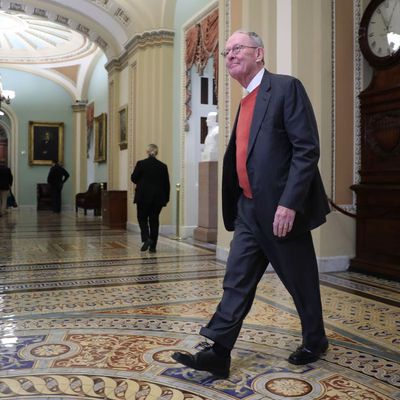
During the second and final day of senatorial questions for the contending lawyers in the Senate impeachment trial of Donald Trump, we heard a combination of now-familiar talking points and a steadily increasing focus on the crucial question of whether witnesses should be called and documents subpoenaed and placed into evidence. That crucial question will be decided tomorrow after four hours (two hours per side) of debate on the topic, which was provided for in the “organizing resolution” that the Senate passed on Monday.
There was some early drama over an effort by Rand Paul to ask a question in which the name of the alleged whistle-blower who brought the Ukraine Scandal to public light was included; Chief Justice Roberts refused to read it. A followup question from other Republican senators — which raised the underlying conspiracy theory about House Democratic complicity in a plot to cook up a scandal — was read by Roberts since it didn’t name the whistle-blower.
By and large, though, the president’s team and helpful Republican senators stuck to their argument that the impeachment measure was a partisan rush job that failed to put together a credible case, and that the call for witnesses was an effort to force the Senate to fix a fatally flawed process. And the House managers continued to insist that the fight against witnesses by Team Trump continued a pattern of claims placing the president above the law and aimed at hiding evidence that ought to exonerate him if he is actually innocent. The only novel feature of these arguments was the insistence of Trump’s lawyers that hearing witnesses would extend the trial for months (mostly because they had a long list of witnesses they would call if Bolton was heard), while the House managers offered to cut a deal to limit witnesses and let the Senate return to regular business while depositions were taken behind closed doors.
Behind the scenes, the conventional wisdom developed that Susan Collins and Mitt Romney would probably vote to hear witnesses (or at least John Bolton), with Lisa Murkowski and Lamar Alexander being the swing senators necessary to get to the needed number of four Republican defections. Murkowski asked whether the factual dispute between the White House and Bolton’s book could best be addressed by hearing Bolton’s testimony, raising Democratic hopes she might defect. And then Alexander let it be known he would announce his position on witnesses in a statement at some point tonight. Could Mitch McConnell and the White House lose this fight yet?
Then came this question:
“Isn’t it true that” is as close as you can get to a flat assertion in question form, suggesting that the shift in the president’s argument from “he did nothing wrong” to “it wasn’t an impeachable offense” had worked. If any conceivable testimony offered by Bolton wouldn’t lift Trump’s misconduct to the level of impeachable offense, why hear him out?
So Alexander’s decision after adjournment was anticlimactic, if not exactly an exoneration of Trump:
Collins actually beat him to the punch with a statement indicating she would, as expected, vote with the Democrats on witnesses:
And Murkowski, having tipped her hand, professed to remain undecided:
Finally, Romney made his position official:
Barring something weird, there are 50 —and probably 51 — firm votes against witnesses, with the difference based on whether you think Murkowski is really undecided. So the big question is whether there are any cards left in the deck for Democrats to play. Chris Van Hollen indicated that he would make a motion Friday that Chief Justice Roberts rule on witnesses in his capacity as the trial’s presiding officer, but there’s no reason to think it would get 51 votes. Roberts could theoretically choose to rule on the evidentiary issue if the vote is tied, but that would violate the Chief Justice’s well-known determination not to expose the Supreme Court to criticism that it is a politically motivated entity.
Earlier, Senate minority leader Chuck Schumer hinted at guerrilla warfare to delay any effort to move straight to the final verdict, as Politico noted:
[Democrats] are also beginning to discuss a backup plan: forcing more tough votes before acquittal.
Those options could range from proposals for a closed-door session to having more time to deliberate before delivering a verdict. No final decisions have been by the party on how to handle the possibility that 51 GOP senators try to move the trial to a quick end. There’s also the matter of whether it’s worth keeping the four Democratic senators running for president in town through the weekend.
The trial rules say “you can deliberate. Obviously, the majority vote determines everything, and again, we will decide that as we move forward,” Schumer said, emphasizing that his focus is on getting witnesses.
Schumer could offer a ton of amendments to a motion to move to the final verdict, as he did to the original organizing resolution. Or, using the Clinton precedent, he could press for a closed-door session in which senators “deliberate” before the final vote — which would allow them to finally speak. In the Clinton trial, each senator was given ten minutes to speak in what was essentially an opportunity to explain her or his vote. If that were replicated, that’s 15 hours of talking, which would certainly make it hard to wrap things up late Friday or early Saturday, as Republicans have hoped.
Democrats have to decide overnight whether fighting acquittal to the last ditch is worth their time, keeping in mind that the real verdict they are pursuing is in the court of public opinion, rendered between now and November 3. Perhaps Alexander is right that justice will be done then.






























